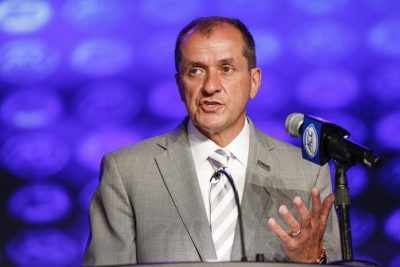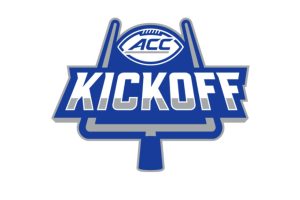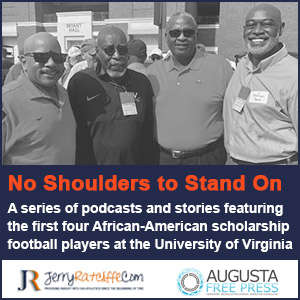Everything Commissioner Jim Phillips had to say at ACC Kickoff Tuesday
Courtesy The Atlantic Coast Conference

ACC commissioner Jim Phillips speaks to the media at the 2023 ACC Kickoff in Charlotte, N.C., Tuesday, July 25, 2023. (Photo by Nell Redmond/ACC)
THE MODERATOR: It’s my pleasure to introduce Atlantic Coast Conference Commissioner, Jim Phillips.
JIM PHILLIPS: Good morning, everyone. Let me start by welcoming each of you to the 2023 ACC Football Kickoff. We thank you for coming to Charlotte and for your time and investment in covering the ACC, our membership, and intercollegiate athletics.
I also want to recognize ACC Network for its live coverage of our now three-day event. If there’s anything we can help you with throughout the event, please let me or our staff know.
Before I share some thoughts about the conference and our tremendous student-athletes, I want to pause and remember three important members of the ACC family. At the end of last season we tragically lost Virginia student-athletes Lavel Davis Jr., Devin Chandler, and D’Sean Perry.
There are still no words that can fully express our collective grief over this devastating and senseless loss. Our hearts and prayers remain with their families, teammates, and the entire University of Virginia community.
Lavel, Devin, and D’Sean, you will never be forgotten by your ACC family.
It’s a privilege to be here and to share the incredible excitement that’s happening in the ACC. Let me start by acknowledging the city of Charlotte, our new conference home. Just a few blocks away on the 12th floor of the Legacy Union building, renovation work will soon be complete, and our staff will be moving into the space in the weeks ahead.
Since announcing our relocation back in September, there has been a lot of positive energy between the city, the conference, and our membership. We’ve already held multiple league meetings in Uptown, which simultaneously provided the opportunity for our school leaders to meet with community and business leaders and the many sports teams that call Charlotte home.
As we ramp up our presence in Charlotte in the weeks and months ahead, we anticipate strengthening our relationship with the city through meaningful partnerships, including future events and championships. With nearly 90,000 ACC school alumni in the Queen City, our bond is already strong.
Running parallel to our office relocation is a new strategic marketing and branding initiative that we began in January. After a thorough process that included not only the conference but our 15 member schools, we are proud to be partnering with Wasserman and their creative agency Laundry Service. We look forward to the next month when we will launch in conjunction with our schools our new forward-facing brand campaign that will be inclusive of television, radio, out-of-home, and digital and social assets.
In addition to our focus on our future in Charlotte, we remain in constant communication with Disney and ESPN, as there is no single business partnership in our industry that is valued more than with a conference’s media rights holder. In certainly one of the most turbulent times in history for both media and college sports, I and the ACC have never felt better about our relationship than we do today. Our commitment to collaborate on way the ACC from a revenue and exposure standpoint has been unwavering.
The work that’s been done over this past year, particularly in the last six months, as the Disney leadership and ESPN has been solidified, has been incredibly important to our partnership are. Jimmy Pitaro, Burke Magnus, Roz Durant, Nick Dawson and their entire team have been terrific, and collectively we have, one, agreed on a comprehensive, mutually beneficial growth and innovation strategy moving forward. And, second, put in motion several priority initiatives, the combination of which we believe will transform our conference for years to come.
Our schools and fans will immediately benefit from significantly increased ACC football television exposure on ABC and ESPN platforms. Elevated production value and innovative creative approaches tied to those ABC broadcasts. A commitment to greater integration of ACC schools across all aspects of the network: Production, programming, storytelling, sales, and marketing, and a collective mission to enhance and grow this unique and very valuable are shared venture.
Meaningful new events and programming led by the debut of the ACC/SEC Men’s and Women’s basketball Challenges, exclusively on the ESPN family of networks. Near and longer-term initiatives include continued creative approaches across all 28 ACC-sponsored sports, especially in football and men’s and women’s basketball. Significant partnership on data and technology, coordinated strategies around the quickly evolving direct-to-consumer marketplace, deeper campus integrations across a range of areas, including programming and production enhancements, coordinated brand positioning, marketing and promotional programs, and most importantly, corporate sales opportunities.
In sum, a comprehensive commitment from the top leadership levels to support our shared goals to innovate, grow, and thrive competitively, holistically, and financially into the next decade and beyond.
In addition to these future initiatives, there were significant enhancements that took place this past year. In August ESPN acquired the rights to the ACC women’s basketball tournament and baseball championship giving ACC an exclusive coverage to the preliminary rounds of both events.
As part of these marquee events, in addition to other championships, ACCN was onsite throughout with live studio programming. In February the ACC announced in partnership with Disney and Ally, whose headquarters are across the street from our new office, that Ally was becoming an official sponsor.
In addition to their sponsorship of the league, Ally is a title sponsor of the ACC women’s basketball tournament and women’s soccer championship and was the presenting sponsor of the 2023 ACC women’s lacrosse championship. Our relationship directly benefits our 15-member institutions, 28 sponsored sports, and nearly 10,000 student-athletes.
We are also thrilled with our collective commitment to the support and advancement of women’s sports, and I applaud our Disney and ESPN partners for working aggressively to foster this amazing relationship.
I will share some additional thoughts on television and the upcoming season, but let me first address some timely league and national topics.
First, I’m proud that our president and chancellors and our athletic directors continue to have healthy, honest, and direct conversations about working together as we collectively navigate the future.
I’m well aware of the narrative and stories surrounding the ACC and our members as well as the frustrations of some of our schools on our financials, but these are not new. The initiatives I just mentioned combined with future endeavors are designed to ensure that the ACC remains a healthy and vibrant conference that competes at the highest level, and is capable of winning nine national titles like this past year, if not more.
At the end of May following an analysis and discussion that took place throughout the past year, the board announced its endorsement of a success incentive initiative that will begin during the 2024/’ 25 academic year. Under this initiative financial distribution enhancements based on team performances from revenue-generating postseason competition will allow our schools to invest and achieve additional revenue.
The working group of presidents and chancellors continue to make progress, and following a full board decision in the future, we’ll certainly share more details.
While there are legitimate discussions and stories regarding revenue and our membership, it’s important that all of us never lose perspective on just what we are doing together.
The last two years the ACC leads all conferences in NCAA titles. All 15 schools won an ACC regular season or championship title this past year. Academically there are no better collection of schools, and our student-athlete experience and support beyond athletics and academics is second to none.
The bottom line is our conference is strong, and I’m extremely bullish about our future together.
From a national perspective our conference continues to be a leader and efforts to find solutions for college athletic’s most pressing issues. We remain focused, which includes making frequent trips to Washington D.C. on working with our representatives to find a national solution to the race to the bottom from state legislators addressing name, image, and likeness.
The ACC remains strongly in favor of our student-athletes benefitting from the use of their name, image, and likeness. The framework that we continued to advance includes preempting the patchwork of inconsistent state laws through federal legislation is critical to providing clarity for our student-athletes and institutions. There’s a need to reaffirm that the student institutional relationship is just that. Our athletes are students, not employees.
The college athletics enterprise must also be able to enhance and adapt the student-athlete experience without the constant threat of lawsuits that use funds for defense that could otherwise benefit our student-athletes.
At the same time we have been crystal clear about protecting our athletes from bad actors through agent certification, transparency, and consistent disclosure of NIL deals and continued education of student-athletes around financial literacy and personal branding. We owe this to all our student-athletes.
I applaud recent efforts on both sides of the aisle in Congress to work together and address these issues. The ACC continues to fully engage to ensure that this momentum towards a national solution continues. ACC institutions do a great job of providing support for its student-athletes, and the protections we seek align with what our student-athletes are asking for as well.
We remain close to our ACC Student-Athlete Advisory Committee, who is here with us today, to make sure we are listening to what’s most important to the overwhelming majority of our student-athletes.
At this time I would like to ask our SAAC representatives to stand and please be recognized (applause).
Our student-athletes, and those that compete in other leagues represent not only themselves, their families, schools, and conferences and even their countries. As we look ahead to the 2024 Olympic Games, consider this: Currently there are more than 100 current or former ACC athletes from 15 sports training on U.S. national teams that aim to qualify for the Paris Olympic Games.
The 2023 FINA World Championships began on July 22nd, and 11 different ACC swimmers will represent Team USA and their schools on the international stage.
Team USA’s opening match of the 2023 FIFA World Cup this past Friday, five ACC athletes from four different schools wore the red, white, and blue, as Team USA seems to claim its third consecutive championships title this summer.
Speaking of the Women’s World Cup, a total of 29 current and former ACC student-athletes representing nine different countries are competing on this year’s biggest stage.
College sports has been incredibly important and successful in providing broad-based programming and educational opportunities for young men and women, which is why it is imperative for the college community to address today’s challenges. Wherever possible, in addition to any assistance we receive from Washington D.C., how might the college community and the ACC continue to lead in order to bring more clarity and sanity to the current environment?
First, NCAA regulations currently prohibit inducements and pay for play. These restrictions must be addressed via a robust national enforcement effort, to the extent possible within current state NIL laws.
Second, NCAA regulations currently prohibit boosters from engagement in recruitment of prospects. The reports of booster engagement in recruiting through collectives and other efforts through the label of NIL are widespread. I will repeat, I strongly and the conference strongly supports student-athletes’ ability to monetize their name, image, and likeness through endorsement contracts, social media opportunities, and other legitimate NIL activities. Payments by boosters tied to attendance at a specific institution is not legitimate NIL activity.
Third, we must act to develop guardrails to ensure that student-athletes have access to NIL opportunities untainted by inducements, as well as reliable information about legitimate NIL opportunities and value.
The recent unprecedented transfers of student-athletes are tainted by inducements disguised as NIL money. Too many student-athletes enter the transfer portal based on rumor or bad advice, only to find they have no place to go. It’s the ultimate game of musical chairs. This is detrimental to their education and future and must stop. We can assist student-athletes by providing as much transparency as possible regarding NIL.
Fourth, we must also act to ensure that student-athletes have access to legitimate representation in the form of certified agents and are making decisions informed by facts, not empty promises made to recruit the athlete.
The current opportunities for student-athletes are immense, and I will continue to work with others in the college community to protect those opportunities and ensure they are untainted by inducements, bad actors, and false promises.
As Commissioner and in unison with the leadership of the league, inclusive of our CEOs, ADs, administrators, and coaches, we will continue to fight for a system that provides access and affordable higher education annually to almost 10,000 ACC student-athletes. We will continue to fight for a system that has provided countless opportunities for young men and women to develop the skills necessary to become leaders when they otherwise may not have had access to college.
We will fight for a system that provides the opportunity for student-athletes to realize their dream of being a professional athlete or representing their country on the biggest international stages. We will fight for a system that has done so much to advance women’s sports in this country, which has even more meaning to me as a father of five with a daughter playing collegiate soccer.
I’ve enjoyed collaborating with new NCAA president Charlie Baker, as have our board of directors and athletic directors. There is significant work ahead, and we look forward to being part of the progress and ultimate solutions for the betterment of all student-athletes.
The College Football Playoff has been an ongoing story line in the ACC continues to be supportive of the expanded playoff. This past year we led an effort that made significant progress and resolutions surrounding a college football 365-day calendar. This initiative has already led to meaningful changes related to player safety that are reflected in the new playing rules that begin this fall.
This includes the clock continuing to run after first downs, unless it occurs inside of two minutes in either half, which will limit the number of student-athlete contact exposures.
Heading into this year the ACC has placed the second most teams in the CFP. Since the inception of the playoff and over the last decade, the ACC has won the second most football national championships.
Before I continue, I do want to take a minute to acknowledge the recent retirement announcement by CFP Executive Director Bill Hancock. Bill is a wonderful friend who has led post-season college football for nearly two decades with incredible steadiness. His love for college athletics and specifically the student-athletes is unwavering, and we look forward to celebrating him and Nicki as they move on to the next chapter.
Today we are here to celebrate the ACC and look ahead to the upcoming football season, and we have so much to be proud of as a conference. It was another record-breaking year as our teams combine to capture the most NCAA championships of any conference, with a league record nine national titles. The 16 NCAA titles over the last two academic years are also the most of any conference.
In addition, 17 ACC teams join the conference’s nine NCAA champions by reaching the finals or semi-finals in their representative sport with seven playing in the national championship game, including an all-ACC contest in women’s tennis and men’s lacrosse.
16 ACC programs finished the year ranked either No. 1 or No. 2 in the final polls. The most of all conferences.
In the final LEARFIELD Directors’ Cup standings, six schools ranked among the top 20, the 21st consecutive year that four or more ACC schools have placed in the top 30 nationally.
From an academic perspective, there’s no stronger collection of institutions than those in the ACC. Whether it’s national academic rankings, graduation success rates, academic performance rates, or other lists of distinction, this league shines.
Each month I invite student-athletes to join our full staff meetings, and we hear countless stories from them that the opportunity to leave with a degree, sometimes multiple degrees, is priceless. This is another area that hits home as this past spring our oldest son completed his second ACC degree, while finishing his eligibility as a track student-athlete, and he is just one of many examples within the conference.
Beyond the classrooms and athletic competition, the ACC remains committed to the ongoing work in racial and social justice, health and safety, and professional development. Two weeks ago we held a 2023 ACC Unity Tour in Washington D.C. This year’s event followed the inaugural tour that took place in Selma and Montgomery last summer, which is absolutely amazing.
During our four days in D.C., ten representatives from each of our 15 schools participated in an immersive experience called Awareness to Action. It was an incredible trip that allowed us to celebrate the 60th anniversary of the March on Washington and experience the National Museum of African-American History and Culture and the U.S. Holocaust Memorial Museum.
The visit also included a gender equity and sports panel sponsored by our Orange Bowl partners. In May our league partnered with the U.S. Council for Athletes’ Health to further the 15 institution’s collective commitment to providing comprehensive services to our student-athletes. The partnership is overseen by the ACC Health Care Administrators Group, which includes experts from each of our member institutions.
We collaborate on conference-wide athletic medicine, health and safety initiatives, including the league’s annual health and safety summit. In addition, ACC sports medicine professionals now have 24/7 access to the council’s membership platform, strategically designed to assist our schools in providing unsurpassed health care.
Our league and member institutions continue to be committed to broad-based programs and the opportunities they provide. On July 1st our league officially welcomed gymnastics as its 28th sponsored sport and 15th women’s sports offering. The 15 women’s sports are the most among our peer conferences, and no other peer conference sponsors more than 28 sports.
We are 37 days away from when ACC football kicks off the 2023 season. I know there is great excitement and anticipation. We welcome two new head coaches to the league. Georgia Tech’s Brent Key and Louisville’s Jeff Brohm. Both are terrific additions to an outstanding group of coaches currently in the ACC.
Following the 2022 regular season, we announced Alberto Riveron as the new ACC supervisor of officials. Al joined the league after serving as an NFL rules analyst the past few years, and was previously the NFL’s senior VP of officiating.
He brings a distinguished 30-year career as both an NCAA and NFL on-field official and an officiating administrator. Al just finished the league’s football officiating clinic last week, and will be available later today in this room. During that time I encourage you to ask about our efforts since his arrival, his campus travels to meet with the coaches, and his collaboration with our officials.
This spring we hired eight position supervisors who have all worked in D1 college football, and all but one currently serves as an NFL official. During the season, these supervisors will assist in evaluating every ACC game to ensure consistency across all on-field officiating positions.
Once again, the ACC’s nonconference schedule is arguably the toughest in the country. 25 games against Power Five opponents, 11 nonconference games against teams ranked in the final 2022 Associated Press Top 25 Poll, 27 games against opponents that appeared in a bowl game last year, and 11 nonconference games against teams in ESPN’s 2023 Way-Too-early Top 25.
The season will begin on Thursday, August 31st, with our teams featured in 12 games over five straight days. No other league plays across all five days on Labor Day weekend, which says this the fifth time in the last seven years. Yes, I’m planning to try to get to every one of those opening games. If you want to join me, please let me know. I’ll take you along.
Last summer the league announced 2023 would be the first of its new 3-5-5 conference scheduling model that provides significant enhancements. The most important of which is that our student-athletes will have a chance to play every school, both home and away, over a four-year period.
The model eliminates divisions, with the top two teams based on winning percentage competing in the ACC football championship game at the Bank of America Stadium on the first Saturday of December.
Following the regular season and championship game, our teams will have the opportunity to compete in the College Football Playoff or participate in a bowl game anchored by our partnership with the Capital One Orange Bowl, the ACC has 12 amazing bowl destinations throughout the country that all provide memorable experiences.
As I indicated earlier and in conjunction with our partners at ESPN, we have significantly increased ACC football television exposure on ABC and ESPN platforms. During the first three weeks, the ACC has scheduled a pair of games on ABC’s Saturday Night Football as well as 11 appearances on ABC, ESPN, ESPN 2. In total, seven ACC contests are scheduled for national ABC broadcasts and ACC Network will also feature 13 games. In fact, of the ten full national ABC telecasts, seven of them feature seven different institutions.
We’re also thrilled that ESPN’s College Game Day announced yesterday that they will be live from the Queen City on Saturday, September 2nd. College football’s premier pregame show will air ahead of the primetime Duke’s Mayo Classic featuring North Carolina.
In addition to our partners at ESPN, we welcome the CW Network to our line-up of broadcast partners. Beginning this year the CW will broadcast 13 ACC football games throughout the regular season. Raycom will produce the games, and we are thrilled with the CW’s national distribution.
Beginning in August ACC Network will embark on the third annual ACC Football Road Trip. Once again, this initiative will deliver 14 one-hour shows airing in primetime from each of our campuses.
Following this forum, I’ll invite the ACC Network to come up and make an announcement. There continues to be significant excitement surrounding the future of ACCN and its football programming.
Before I close, and unrelated to the ACC, I do want to briefly address the ongoing matter at Northwestern, as I’m sure some of you have questions. As you are aware, I released a statement last week. This is a very difficult time for the Northwestern community, and my heart goes out to any person who carries the burden of mistreatment or who has been harmed in any way.
During my 30-year career in college athletics, my highest priority has always been the health and safety of all student-athletes. As you know, with this matter in litigation, I’m unable to share anything more at this time.
I’m happy to address your questions about the ACC and ACC football. So let me turn it over to Amy, and we’ll get started.
THE MODERATOR: Thanks, Commissioner. We will get to as many questions as we can here this morning.
Jim, you have talked a lot about exposure for football with ABC and having more of those windows. With the preseason expectations for Florida State and Clemson headed into this year, how important is it, do you feel, for the ACC to be able to capitalize on some of these bigger windows with some of its marquee programs to help change the perception and the narrative of the league?
 JIM PHILLIPS: Good question. I think for all of us you get into the competitive ACC season, and it’s a little bit cannibalization. So your point of differentiation for all conferences it ends up being the nonconference games. So we have to get off to a really good start.
JIM PHILLIPS: Good question. I think for all of us you get into the competitive ACC season, and it’s a little bit cannibalization. So your point of differentiation for all conferences it ends up being the nonconference games. So we have to get off to a really good start.
It doesn’t negate having a really good season, if you don’t, but if you stumble once or twice it’s really difficult to overcome that. So you mentioned a couple of our teams, and I think we have a whole host of others that also can have a really good season.
Sometimes our ranked teams act just like that and perform right off the gate in a high level, but sometimes those teams that aren’t ranked or are maybe at the bottom of the top 25 really start to gel. So I’m really excited about it. I’ve had a chance to really dig in this summer about our rosters and love our coaches as always, but I think, Andrea, with the schools you mentioned, you know, Florida State and Clemson getting a lot of opportunities, I think we have a bunch of others that can also get off to a good start and show that the league is a really, really good football league.
I mention in my remarks about the CFP. I just think sometimes it’s lost because of whatever narrative is out there. We’re second most in titles and appearances in the CFP, and I think that equates in modern day football to having success.
Commissioner, a year ago in this same room you mentioned guardrails and mandating NIL. Players seem to love have it, but coaches seem to have a disgrunt about players being able to make money off their name, image, and likeness. Lane Kiffin recently mentioned college football being a complete disaster right now with the NIL. What are your thoughts on college football as a whole, and do you think it’s a disaster to have NIL in totality?
JIM PHILLIPS: I think here’s where name, image, and likeness is off the track, and that is what I described about Washington D.C. For certain the student-athletes deserve the opportunity to engage in name, image, and likeness, and I had a chance to address that group yesterday, and we’ve been a strong proponent of it.
Where it’s really difficult is these disproportionate state-by-state rules and legislation, and that’s what we’re trying to change. I think as you look at the NCAA and the history of it, we’ve kind of all raised our right hand and indicated, hey, we’ll follow these rules. You may not like all of them, but we’ll follow them, but the current NIL legislation is so disproportionate about what you can do in one state versus another state. I think that’s part of the frustration that our coaches are faced with.
So having something, some kind of federal legislation, that allows some opportunity for there to be consistency across competition. I say this, when you have inter and intra-state competition, you want fairness in everybody playing with the same types of rules. So that’s why Washington D.C. Congress has been really important, and we’ve made some strides, but I would also say that it’s not probably ready for public consumption now. We are thinking about a plan B if we can’t get help from Washington D.C., because that’s I think the biggest difficulty that our coaches are faced with.
But it’s not going away, and nor should it. This is not like the NIL is not going to be around anymore. We need to continue to do it.
The final thing I’ll say, I want us to continue to make sure literacy is a very important part across our campuses and within the conference that our student-athletes are understanding their opportunities, their brand, and they may engage or they may not engage, but they have that opportunity.
Two quick ones: A year ago in this room you were answering questions about the future of the league. You just addressed that you hear the talk about the financials. What steps maybe have been taken in the past year to have a better pathway forward for the conference? And then if I could also just have you give a synopsis as to how the CW package came together and how quickly that was all done to get where you are with that?
JIM PHILLIPS: Thanks, Pete. I would say this, the league is healthy. It just is. Certainly there is rumblings — again, we all saw what happened in the springtime. But the group has come together in a way to me that demonstrates they want to work together to find solutions.
Your question about what solutions has the conference come forward with? Well, we’ve worked with Fish Bait on our eight-point plan generating new additional revenue. The ESPN partnership is really strong, and ESPN and the ACC are completely motivated together to generate additional dollars. You see that the conference presidents and chancellors have initiated the success incentive initiative, which is going to distribute dollars in a disproportionate way. We’ve never gone down that road before in the ACC, and I’m not sure many conferences have.
So revenue generation continues to be a priority. But let me be clear also, this league is third right now in revenue as we go forward into wherever the next TV deals are for other conferences where, we’ve looked at it. We’ve had multiple TV consultants. Third is certainly a good position, but we want to gain and gain traction financially in order to close the gap with obviously the SEC and the Big Ten, who have leapfrogged everyone.
I think one of the presidents said it best, are we chasing a dollar amount, or are we chasing success? I think there’s a difference there. If you are chasing a number, it takes you down a different path. If you are chasing success competitively in football and basketball and all of our sports, then I think every institution has an idea of what they need.
So, again, I feel really strongly about this league, and I think people are missing it when they’re not paying attention to the results of how well the conference has done. So it will continue to be a priority and certainly has the attention of everybody from our board on down.
Then the CW relationship, listen, we’ve had a great relationship with our TV partners. Raycom has been a wonderful partner of the ACC forever, and they were incredibly helpful along with ESPN in getting the CW, and I think all of you understand distribution and eyeballs and being able.
To be visible in all of the regions that our schools are, but across the country, and that was one of the things when I came almost, well, two and a half years ago, the frustrations that we had about “I can’t find my team, I can’t find some of the games.”
So they came in and took the place of Bally, who we appreciate the relationship that we have. Raycom will produce the games and be distributed on the CW. CW is getting into sports, et cetera. They have LIV Golf, and that’s getting a lot of attention for different reasons, but we are really excited about that.
I think Dennis Miller was going to try to be here from the CW from Los Angeles. I’m not sure he is here, but if he is, maybe raise your hand. If you have any questions later, you can kind of go over and see him. But excited about the CW.
In talking about the revenue gap versus the results and trying to find more money and working with ESPN, how do you keep the schools like Florida State, like Clemson that have spoken out publicly, committed while trying to bridge what may be at some point a $40 million gap, and do you think that that gap can be bridged, maybe not to $40 million, but, hey, we can get you to within $15 million, $10 million?
JIM PHILLIPS: I think that’s the right approach to make it. Instead of trying to get a number, trying to bridge it as far as you can. How you get it done? You work collaboratively. That’s what we’ve done.
Those two institutions have been terrific to work with. I mean, they have great leadership. Rick McCullough is a wonderful guy. Jim Clements is a wonderful guy. They love sports and their institutions, and I know they also love the ACC and are trying to figure a way through.
But it’s all of our schools, right? All of our schools are incentivized to make sure that we have as healthy of a financial portfolio as we possibly can. After the spring, if we wouldn’t have had any discussions or we wouldn’t have come out with a success incentive initiative program, I may have felt differently, but the regularity of which the board is meeting now and the regularity of our ADs meeting, et cetera, and how good ESPN has been, they understand the volatility that there is, but they also are looking to grow financially based on some of their recent events.
So you have a lot of mutually beneficial outcomes in this thing, so staying together, working collaboratively, working strategically, and we have some other things that we’re working on I can’t address with this group right now, that are pretty exciting to try to address that revenue gap.
You talked about lobbying in D.C. regarding NIL. I know some of the potential options that are out there would include a third-party government entity that would oversee this. How comfortable are you with the idea of sort of outsourcing NIL oversight to a third party government-run organization?
JIM PHILLIPS: Well, we have to look at all of our options. If that ends up being the best one and everybody is in line with that, then you have to do it. Then you have to do it. You start to get leakage about kind of controlling your organization and the association and making decisions when you go to Washington, so there’s always some danger there.
But we have to do some things differently. So if it ends up being in that kind of structure as you described, David, then we’re going to have to do it.
You talked a lot about where you are in terms of the conference and looking at growing and expanding and bridging that gap. One of the biggest things that’s out there that people constantly whisper about with the ACC, a team that’s on the slate of televised games for ACC is Notre Dame. Is there any progress towards getting Notre Dame to join as a full member with football as well, or is that not something that’s on the table at the moment?
JIM PHILLIPS: Another really good question. We’ve had a lot of conversations, let me put it bluntly, with Notre Dame, and they’ve been very clear. They value their independence, and I think they feel strongly that that will continue well into the future.
If they ever have the desire of joining the conference, they know that we would welcome them with open arms, but I think — I can’t speak for Jack right now and Pete in the future or Father John, but I think it’s been a healthy relationship both ways for the ACC and for Notre Dame.
Their sports, other than football, I think have thrived in the ACC. I think they really enjoy the academic prowess that the ACC brings as well, but they’ve been pretty clear about their desire to stay independent. So I don’t see that changing any time soon.
Curious, you mentioned the revenue distribution and all those things. Did kind of having all of that come out at Amelia Island into the open with everybody discussing it change in your mind the sort of mood in the conference about some of the stuff? Was there a tangible change since May in terms of addressing the future of the ACC that you saw?
JIM PHILLIPS: I really believe it helped us. I do. It was painful to go through. Nobody liked it, but it really started to develop this honesty and candor. Not that it hasn’t been an honest group before, but more candor than anything else about, hey, here are the issues we have or here is what we’re concerned about.
I think that’s healthy. I think that’s healthy in any organization. You can maybe have it at the coach level or at the AD level, but when it’s at the CEO level with our presidents and chancellors, I think that has helped us come together and understand these are some of the things that we have to address.
And then as I mentioned a little bit ago, I think the frequency, Luke, of us now getting together, we meet once a week now. Sometimes more. Then if we don’t have anything to go over, we can cancel the meeting, but it’s on our CEO’s schedule, and even throughout the summer we’ve had to me more meetings than my first two summers with the league by far. I think double even combined the first two years.
They’re attentive. They’re aware. There’s lots of discussion going on. At the end of the day, I think you turn a tough situation into a positive one.
You were talking about the patchwork of NIL state laws. What in your mind is kind of the practical impact of that, considering there hasn’t been much enforcement of anything so far?
JIM PHILLIPS: I think that’s the disappointing part of it, Matt. I think our league had the most visible one, and I just — I still kind of shrug my shoulder on that. I don’t quite understand that, of everything that’s going on.
At the end of the day I think we have paralyzed the enforcement staff, not intentionally, but with state NIL laws, and they’re not sure exactly the enforcement abilities that they have, et cetera.
That’s why some kind of consistent language across the country would allow our enforcement staff to me to be a lot more successful in doing the work that they need to do.
So I think that’s part of the earlier question of the frustrations of the coaches, et cetera, that they have and our athletic directors and even chancellors, and it causes some disruption in your own league with our ten states because they all look different, the laws do.
I’m hopeful we can get there. I really do. I think we’ve made a ton of progress over the last two or three months, and a lot of us have almost lived in Washington D.C. because of the frequency of meetings with both sides of the aisle. I am cautiously optimistic that we can get something done.
I understand the belief that they’re students, not employees, but are there contingencies that you have discussed with the presidents or other commissioners in the unlikely event that the courts decide differently in the next couple of years?
JIM PHILLIPS: You have to be ready for anything, Joe. You know that. This is a fluid, changing landscape. What a student-athlete and their experience is and being able to get support and monetize their name, image and likeness what that looked like ten years ago versus today, we have to be ready for almost anything.
The courts have been active all the way up to the Supreme Court, so it would be naive for us to think that, hey, we can just kind of do this thing ourselves without much interference.
We’ll have to continue to look at it. I know that that is not the desire of the ACC presidents at all, but you know, at some point it could be a reality.
With the College Football Playoff expanding, you mentioned the nonconference schedule. For example, Florida State, they have upcoming home and home games of Alabama and Georgia, two of the top programs in the country right now. With the playoff expanding, do you anticipate more of these home and homes in the future, and how can that help lift the profile of the ACC as a whole?
JIM PHILLIPS: I think they go together. They’re interconnected. With expanded playoff, I think you’ll see more of those kind of games because you can suffer a loss and maybe even two and still get into a 12-team playoff.
So the unique thing about scheduling is it’s done individually, so the conference office doesn’t have a lot of influence on it. We’ve tried to set up some games like we did in Ireland, which will be great. That’s a conference game.
I commend our schools that are playing difficult nonconference games. What I would like to see in the selection moving forward is there being more emphasis on the games that you are playing, and what’s the totality, what’s the résumé look across a 12-game schedule? Not just what you have done in your own conference, but who have you played in the nonconference schedule?
So I look forward to those games and many more that you described.
How close are you and your fellow Commissioners to finalizing the revenue distribution from the expanded playoff, and what impact will that have on what formula you eventually finalize for your success initiative?
JIM PHILLIPS: Those also kind of go hand-in-hand, David. No, we don’t know all the financials just yet of some of the postseason, so that’s going to work into it.
But I know that the group is eager to get this finished. This is not another year away or anything like that. We’re going to input it next year. I think they really are interested and in short order getting something done and structured in a way so everybody kind of knows what those financials potentially look like, not knowing all the numbers. So I would say a more near-term than longer-term.
I appreciate that.








